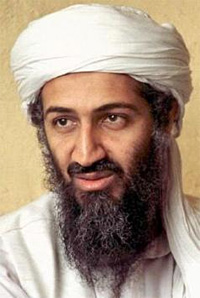
|  |  |  Editorials | Opinions | October 2008 Editorials | Opinions | October 2008  
The Endorsement From Hell
 Nicholas D. Kristof - The New York Times Nicholas D. Kristof - The New York Times
go to original


| | Osama bin Laden (AP) | | |
John McCain isn't boasting about a new endorsement, one of the very, very few he has received from overseas. It came a few days ago:

"Al Qaeda will have to support McCain in the coming election," read a commentary on a password-protected Islamist Web site that is closely linked to Al Qaeda and often disseminates the group's propaganda.

The endorsement left the McCain campaign sputtering, and noting helplessly that Hamas appears to prefer Barack Obama. Al Qaeda's apparent enthusiasm for Mr. McCain is manifestly not reciprocated.

"The transcendent challenge of our time [is] the threat of radical Islamic terrorism," Senator McCain said in a major foreign policy speech this year, adding, "Any president who does not regard this threat as transcending all others does not deserve to sit in the White House."

That's a widespread conservative belief. Mitt Romney compared the threat of militant Islam to that from Nazi Germany or the Soviet Union. Some conservative groups even marked "Islamofascism Awareness Week" earlier this month.

Yet the endorsement of Mr. McCain by a Qaeda-affiliated Web site isn't a surprise to security specialists. Richard Clarke, the former White House counterterrorism director, and Joseph Nye, the former chairman of the National Intelligence Council, have both suggested that Al Qaeda prefers Mr. McCain and might even try to use terror attacks in the coming days to tip the election to him.

"From their perspective, a continuation of Bush policies is best for recruiting," said Professor Nye, adding that Mr. McCain is far more likely to continue those policies.

An American president who keeps troops in Iraq indefinitely, fulminates about Islamic terrorism, inclines toward military solutions and antagonizes other nations is an excellent recruiting tool. In contrast, an African-American president with a Muslim grandfather and a penchant for building bridges rather than blowing them up would give Al Qaeda recruiters fits.

During the cold war, the American ideological fear of communism led us to mistake every muddle-headed leftist for a Soviet pawn. Our myopia helped lead to catastrophe in Vietnam.

In the same way today, an exaggerated fear of "Islamofascism" elides a complex reality and leads us to overreact and damage our own interests. Perhaps the best example is one of the least-known failures in Bush administration foreign policy: Somalia.

Today, Somalia is the world's greatest humanitarian disaster, worse even than Darfur or Congo. The crisis has complex roots, and Somali warlords bear primary blame. But Bush administration paranoia about Islamic radicals contributed to the disaster.

Somalia has been in chaos for many years, but in 2006 an umbrella movement called the Islamic Courts Union seemed close to uniting the country. The movement included both moderates and extremists, but it constituted the best hope for putting Somalia together again. Somalis were ecstatic at the prospect of having a functional government again.

Bush administration officials, however, were aghast at the rise of an Islamist movement that they feared would be uncooperative in the war on terror. So they gave Ethiopia, a longtime rival in the region, the green light to invade, and Somalia's best hope for peace collapsed.

"A movement that looked as if it might end this long national nightmare was derailed, in part because of American and Ethiopian actions," said Ken Menkhaus, a Somalia expert at Davidson College. As a result, Islamic militancy and anti-Americanism have surged, partly because Somalis blame Washington for the brutality of the Ethiopian occupiers.

"There's a level of anti-Americanism in Somalia today like nothing I've seen over the last 20 years," Professor Menkhaus said. "Somalis are furious with us for backing the Ethiopian intervention and occupation, provoking this huge humanitarian crisis."

Patrick Duplat, an expert on Somalia at Refugees International, the Washington-based advocacy group, says that during his last visit to Somalia, earlier this year, a local mosque was calling for jihad against America - something he had never heard when he lived peacefully in Somalia during the rise of the Islamic Courts Union.

"The situation has dramatically taken a turn for the worse," he said. "The U.S. chose a very confrontational route early on. Who knows what would have happened if the U.S. had reached out to moderates? But that might have averted the disaster we're in today."

The greatest catastrophe is the one endured by ordinary Somalis who now must watch their children starve. But America's own strategic interests have also been gravely damaged.

The only winner has been Islamic militancy. That's probably the core reason why Al Qaeda militants prefer a McCain presidency: four more years of blindness to nuance in the Muslim world would be a tragedy for Americans and virtually everyone else, but a boon for radical groups trying to recruit suicide bombers. |

 |
|  |



